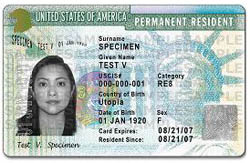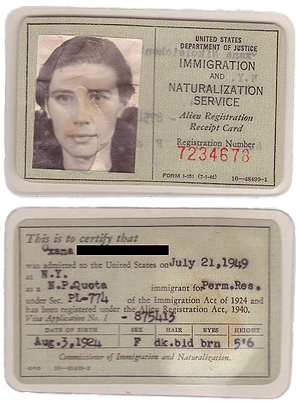
How to Keep Permanent Residence
Permanent residence is a poor name for a legal status that can be so easily lost. Aside from tax and dual citizenship considerations for a small group of people, permanent residents generally are better off applying for US citizenship as soon as they are eligible. Residents who travel outside of the United States frequently, or for long periods, as well as those convicted of a variety of crimes often lose their permanent residence.

If you are convicted of crimes like possession of drugs, you may be ordered deported and be ineligible to apply for US residence again ever. Suppose you have a friend or family member who possessed an illegal drug and you were in the same car and were unable to prove it wasn't yours? Juries tend to be unforgiving in such situations. Even if you've been a US resident for 50 years, you will find yourself on the first plane home and you won't be coming back.
We've helped residents convicted of crimes regain their residence, but it is an expensive and risky process. A simple naturalization application can avoid all of these problems. We've sat listening uncomfortably as a client explained that he didn't apply for naturalization for the past 20 years because the $675 filing fee was too expensive. But now that same resident faces $10,000 or more in legal fees to defend his case.
Unless you have special tax, or dual citizenship reasons for not applying for US citizenship, do yourself and your family a favor and consider applying for citizenship now.
You Can Lose Your Residence Through Absences
Your intent to remain a US resident factors prominently in USCIS's determination of whether you abandoned your US residence. But there is a general presumption that a continuous of less than 180 days indicates that you did not abandon your residence. The law provides that a permanent resident reentering the United States after an absence of 180 days or less does not need to apply for admission. 8 USC § 101(a)(13)(C)(ii). Please be careful to note that 180 days and six months are two different things. There are many Internet resources including law firm websites that state the rule at 8 USC § 101(a)(13)(C)(ii) sets the bar at six months and this is not true. If you are absent for more than 180 days and less than six months (which is possible during many times of the year), you are applying for admission and must prove that you have not abandoned your permanent residence.
The law provides that a permanent resident reentering the United States after an absence of 180 days or less does not need to apply for admission. 8 USC § 101(a)(13)(C)(ii). Please be careful to note that 180 days and six months are two different things. There are many Internet resources including law firm websites that state the rule at 8 USC § 101(a)(13)(C)(ii) sets the bar at six months and this is not true. If you are absent for more than 180 days and less than six months (which is possible during many times of the year), you are applying for admission and must prove that you have not abandoned your permanent residence.
Absences of more than 180 days and less than a year shift the burden to you to prove you haven't abandoned your residence, and absences of more than a year make it extremely difficult to overcome the presumption that you abandoned your residence.
USCIS considers several factors to determine if you abandoned your permanent residence:
- The length of your absence from the US
- The reason for your absence
- Whether your trip abroad was scheduled to end upon a certain date
- The location of your family
- Whether during your absence you filed US tax returns that indicated you were a US resident
- Whether you were employed abroad on a specific project or job for a fixed period
- Whether you maintained "ties" to the US like a residence, bank accounts, and debt accounts
If you know you will be absent for more than six months, apply for a reentry permit. A reentry permit allows you to remain outside of the United States for up to two years for any reason you like (but you may never remain absent from the US beyond the permit's expiration date). Reentry permits are easy to obtain, but you have to apply for them before you depart. You may not remain absent from the United States for a year and then try to obtain a reentry permit to fix your problem. Remember to plan ahead to avoid problems.
You Can Lose Your Residence Through Criminal Convictions
Conviction of certain crimes guarantees that you will lose your US residence. These crimes include (1) crimes of "moral turpitude," (2) controlled substances violations, and (3) "aggravated felonies." Aggravated felonies are defined through statute and case law and require a careful individual determination of your matter (if you'd like us to evaluate your case, please contact us).
An aggravated felony is generally:
- A crime of violence for which the term of imprisonment is at least one year;
- A theft offense (including receipt of stolen property) or burglary offense for which the term of imprisonment is at least one year;
- Illicit trafficking in drugs, firearms, destructive devices, or explosive materials;
- An offense that involves fraud or deceit in which the loss to the victim or victims exceeds $10,000;
- Offenses related to alien smuggling (though some exceptions apply);
- Murder, rape, or sexual abuse of a minor, and
- Any attempt or conspiracy to commit an aggravated felony.
A good example of the unexpectedly severe consequences of these rules is Carlos Pacheco. Mr. Pacheco entered the United States when he was six-years-old. In 2000 a federal appeals court held that he was an aggravated felon based on a misdemeanor conviction for stealing Tylenol and cigarettes. He lost his residence and was ordered deported.
Possession of any illegal drugs is a ground for deportation and also a bar to many defenses to deportation. While there is an exception for a person convicted of possession of 30 grams or less of marijuana for personal use, it is unwise to take the chance.
How to Keep Your Status
The best way to keep your status is to apply for naturalization when you become eligible. If you plan on remaining permanently in the United States and you do not have any serious tax or dual citizenship issues, make that application now. If you like, we can help you. If you do not want to apply for US citizenship, but you plan to be absent from the US for a long period of time, apply for a travel document before you depart for a hassle-free reentry to the United States.
- Log in to post comments
visit us at:
San José, CA 95008
Santa Cruz, CA 95060
The Olender Pro Bono Project
We represent some clients who have compelling cases and little money at no charge. Sean received the Benito Juarez human rights award in 2008 and the ALRP Volunteer Award in 2012 for taking more than 10 pro bono cases in 12 months. We need volunteers. E-mail Debbie to volunteer.
Change Your Address at DHS!
If you are not a US citizen, you must change your address with DHS within 10 days of moving or face deportation. Click Here.






































